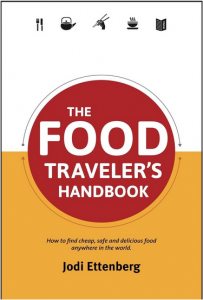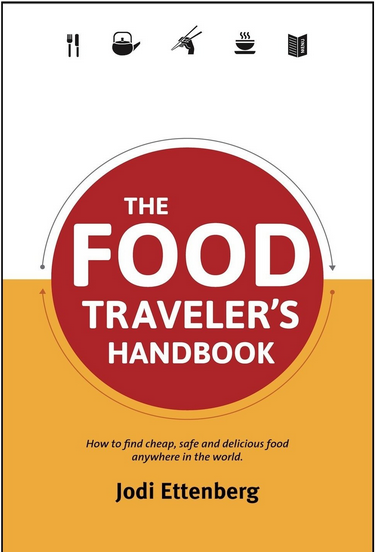A review of a food book? On a blawg? Wait for the connection.
 The Food Traveler’s Handbook is a guide for people traveling to far-flung corners of the globe and understand that there are real people, living real lives in these other countries. There is more to be had than tourist hubs, hotels, and pre-packaged corporate restaurants. The old adage about dive bars is approriate:
The Food Traveler’s Handbook is a guide for people traveling to far-flung corners of the globe and understand that there are real people, living real lives in these other countries. There is more to be had than tourist hubs, hotels, and pre-packaged corporate restaurants. The old adage about dive bars is approriate:
In a true dive bar, you’re worried about getting stabbed. In a “dive-themed” bar, you likely want to stab everyone else.
The Handbook is largely about 3 things:
- Good food
- Cheap food
- Getting the two above safely
The book is born from the desires of former corporate lawyer, Jodi Ettenberg, (aha!) to explore the world through the canvas of food. Jodi left the world of Big Law in order to pursue her hunger for world travel; chronicling her experiences at Legal Nomads for the past 4 years.
As noted above, Handbook is mostly about good, cheap food. Jodi points out what most food lover’s already know: very often the best food is not found in nice restaurants. Personally, I’ve always referred to this as “shack theory.” If you’re in an out-of-the-way area and come upon a ramshackle looking place serving food–but the parking lot is full–you should probably stop and eat there. People aren’t there for the location. Or the decor. Or that it’s somewhere cool to be. They’re there for the food.
Jodi lays out how to explore new countries and cultures in pursuit of flavorful, local cuisine. Handbook lays out why cheap is often better, and gives good information on how to find and bond with local food lovers. Jodi has been solo for most of her traveling so also brings to bear lots of nuances and tips that only an experienced traveler would have when it comes to safely going off the beaten path in search of food.
But what sets Handbook apart–what makes it compelling–is the telling of the tale. Anyone can give such simple advice: Eat good, cheap food. People understand that, it’s straightforward. Big deal. Who needs an entire book about it?
 But very rarely does simple, straightforward advice compel people to action. It doesn’t win hearts and minds. People gloss over it, are indifferent. They’ve heard it all before. To catch people’s attention you need a hook–a tale to tell–and Jodi has them in spades. Throughout Handbook, Jodie interweaves her own experiences in China, Malaysia, Russia (and more) into the book; creating a compelling narrative of exploration that makes the reader want to embark on their own culinary adventures. Handbook makes the reader want to do something. This is the highest form of persuasive writing.
But very rarely does simple, straightforward advice compel people to action. It doesn’t win hearts and minds. People gloss over it, are indifferent. They’ve heard it all before. To catch people’s attention you need a hook–a tale to tell–and Jodi has them in spades. Throughout Handbook, Jodie interweaves her own experiences in China, Malaysia, Russia (and more) into the book; creating a compelling narrative of exploration that makes the reader want to embark on their own culinary adventures. Handbook makes the reader want to do something. This is the highest form of persuasive writing.
It’s a good thing that Jodi left corporate law because such a talent would be a waste there – but not in litigation. Writing to change minds and opinons is the heart of good legal writing. Not case law or fact patterns or procedure. Telling a story that motivates people to action is difficult thing and it’s a pleasure to see it in action when you come across it.
If you want to learn how to explore a foreign food culture, I can’t imagine a better choice.
Click Here To Buy It Now













